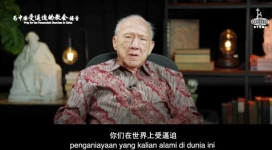MONTGOPMERY, Ala. (AP) - John Giles was a businessman, former aide to two governors and one-time unsuccessful candidate for lieutenant governor when, in 1999, he became president of the Christian Coalition of Alabama - a relatively quiet state organization mostly involved in national issues.
After working for former Republican governors Guy Hunt and Fob James, Giles had an idea he might be able to have an impact on the state as the Christian Coalition president.
"I had kind of seen in my Hunt days and my James days, the good, bad and the ugly of state government. I wanted to wake up and have an impact on public policy and elections," Giles said.
He moved the organization's offices from Birmingham to Montgomery at about the same time that a new governor was taking office - Democrat Don Siegelman, who had big plans to create a statewide lottery. It was a plan that put him almost immediately at odds with Giles, who helped lead an almost 10-month fight that ended in the defeat of Siegelman's plan and showed the clout of the religious right.
Giles and his wife, Deborah, say they will now be looking for new battles to fight as he has resigned, effective next week, as president of Christian Action Alabama - the organization's name since its recent split from the national group.
The lottery fight was a battle that turned Giles quickly into a vocal lobbyist, frequently seen in the hallways of the Alabama Statehouse, lobbying against gambling, tax increases, abortion and other issues on the Christian Coalition agenda. He also pushed the organization's voter guides and legislative report cards, which are distributed in churches across Alabama.
"I think he's made the Christian Coalition the effective force it has been in Alabama politics in recent years," said University of Alabama political scientist William Stewart. "Every time I go to the Legislature, I see John Giles in the gallery. He's put the Christian Coalition on the map."
Giles said he still doesn't know what the future holds. He said he is considering returning to private business, but also may pursue opportunities where he would "have an impact on public policy and government." He said he has no plans at this time to run for public office.
Besides well publicized fights to stop gambling and tax increases, Giles has also fought charges that his campaigns against gambling were financed by Indian casinos in Mississippi, which he has vehemently denied.
The former executive director of the national Christian Coalition, Ralph Reed, has acknowledged taking money from lobbyists representing four Indian tribes with casinos, including the Mississippi Band of Choctaw Indians.
The Choctaws operate two casinos in Philadelphia, Miss., that draw large crowds from Alabama. Reed said his work involved helping defeat gambling measures in Alabama and other states. Giles has denied that money was ever used to fight gambling initiatives in Alabama, but he did question the tactics of Reed.
"Ralph Reed didn't get us gambling money, but he did get close to it," Giles said.
One of his loudest critics in the Legislature has been Rep. Randy Hinshaw, D-Meridianville, who has repeatedly sponsored legislation to force the Christian Coalition and other nonprofit organizations to disclose the source of money used to fight referendums, like the lottery and tax issues. Giles has lobbied hard against the bills, which have been defeated.
"I still believe you should disclose when you get this kind of money to influence Alabama elections," Hinshaw said.
Even though they are often on the opposite side of political fights, Hinshaw said he has found Giles to be an effective lobbyist for the Christian Coalition positions, but said he thinks he lost some of his influence after the revelations concerning Mississippi gambling money.
Sitting with his wife in the living room of their 100-year-old house in Montgomery's Garden District - about a block from the governor's mansion - Giles recalled the highs and lows of the past eight years, including his successful opposition of the lottery and Gov. Bob Riley's tax increase plan.
Giles said the early days were tough, when he was working for no salary and trying to figure out a way to stop the momentum growing for Siegelman's lottery plan.
In May of that year, their 19-year-old son, Micah, was killed when his car apparently ran off Interstate 65, leaving John and Deborah Giles to wonder how they could continue with their work.
"Every bit of scripture is put to the full test with the loss of a son. Either you believe in heaven or you don't," Giles said. "It was like I was on a ship and when I lost my son it was like a direct hit that threw me to the deck."
He said Deborah was "stronger" and helped the couple and their two surviving children get through the tragedy. It also helped that their first grandchild, Grace, was born several days after Micah was buried.
One mission for the Giles after leaving the Christian Coalition presidency is to find a publisher for a book named "Called Home" that he and his wife have written about Micah's death. Giles is also working on another book titled "Gold Rush on the American Value Voter" about efforts to reach voters with moral values.
Giles said the lottery fight was a warmup for 2003, when he went to battle against Riley - a man Giles had supported and considered a friend. Giles opposed Riley's plan to raise taxes by $1.2 billion for education and other state services and lower income taxes for the working poor. Giles said he urged Riley not to introduce the tax package.
"It was the toughest public policy debate I've ever been in," Giles said. "I didn't think it was good public policy. You can't tax your way out of a deficit."
Giles even went to battle with his own national organization. National Christian Coalition President Roberta Combs came to Alabama and endorsed Riley's tax package, particularly praising a part of the plan that would have raised the income threshold where poor Alabama residents begin paying taxes from a then lowest-in-the-nation $4,600. The threshold was eventually raised last year.
Giles said he believes that break with the national organization led his Alabama group and those in some other states to divorce themselves from the national group.
Giles will also be remembered as an outspoken supporter of former Alabama Chief Justice Roy Moore, who was removed from office when he refused a federal court order to remove a Ten Commandments monument from the Alabama Judicial Building. In recent years he successfully fought for a statewide amendment to make same-sex marriages illegal in Alabama and for a law to make it two crimes instead of one to kill or assault a pregnant woman.
© 2006 AP Wire and wire service sources. All Rights Reserved.







